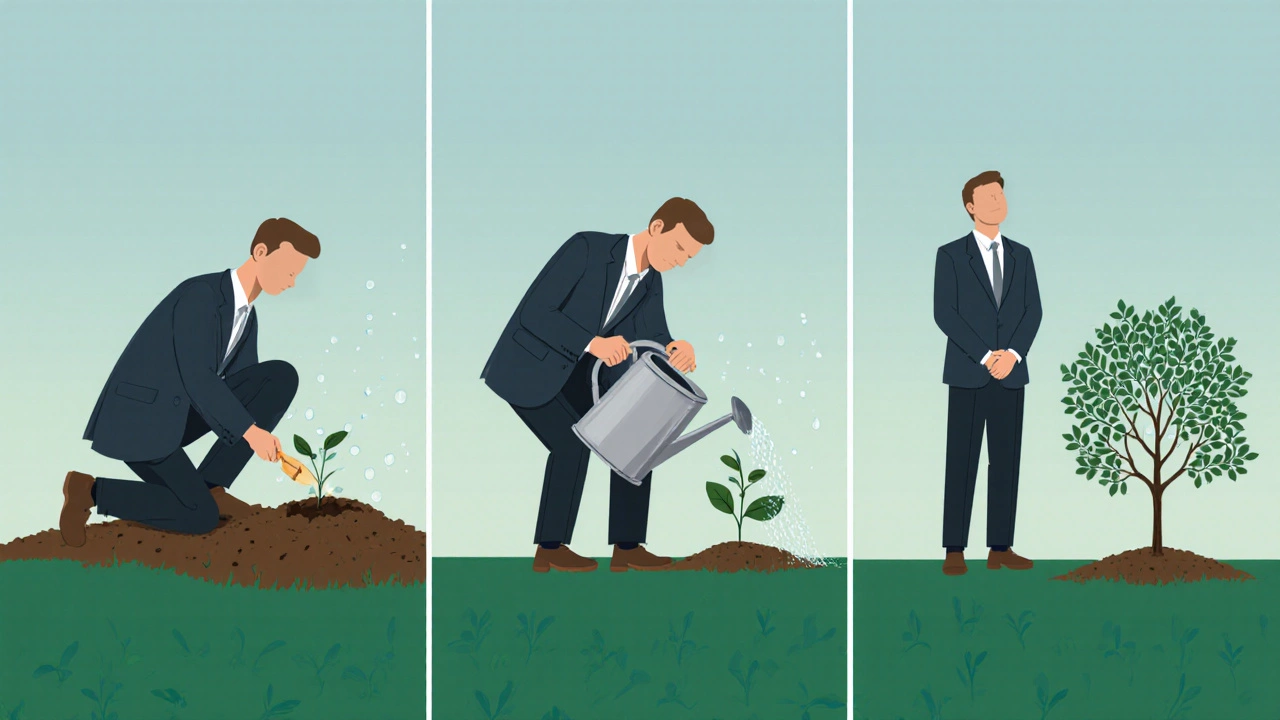Trust-Building Habit Tracker
Your Progress Summary
Track these habits daily to strengthen your relationships. Each completed habit contributes to your overall trust score.
- Communication: Clear and honest dialogue
- Consistency: Reliable actions over time
- Vulnerability: Sharing openly and authentically
- Accountability: Taking responsibility for your actions
Key Takeaways
- Trust starts with reliable communication and consistent actions.
- Vulnerability shows confidence, not weakness.
- Set clear boundaries and hold yourself accountable.
- Small daily habits compound into lasting confidence.
- Regularly review and adjust your approach as relationships evolve.
Understanding Trust
When we speak of Trust is a firm belief in the reliability, honesty, or ability of another person, we are addressing the very foundation of any meaningful connection. Without it, conversations feel hollow and commitments wobble. For a modern gentleman, nurturing trust is as essential as polishing a leather shoe - it requires care, attention, and the right tools.
To build trust you must first understand that it is not a single act but a series of repeated, intentional behaviours that signal reliability over time.
Foundations of Trust
1. Communication - The Currency of Credibility
Clear, honest dialogue is the first pillar. Communication the exchange of information, ideas, or feelings becomes the pulse that keeps a relationship alive. Speak plainly, listen actively, and avoid vague promises. When you say you will meet at 7p.m., arrive at 7p.m. - punctuality is a silent endorsement of reliability.
2. Consistency - The Bedrock of Predictability
Being dependable day after day creates a safety net. Consistency the quality of being unchanging in attitude or performance means aligning your words with your actions, no matter the circumstances. If you promise to support a colleague’s project, follow through even when workloads peak.
3. Vulnerability - The Confidence to Show Up
Contrary to popular myth, vulnerability is a strength. Vulnerability the willingness to expose oneself emotionally or physically signals that you trust the other person enough to share doubts, fears, or aspirations. A gentle admission like, “I’m nervous about this presentation,” invites reciprocity and deepens the bond.
4. Empathy - Walking in Their Shoes
Empathy is the ability to understand another’s perspective without judgment. Empathy the capacity to feel what another person feels allows you to respond with relevance, showing that you value the other’s experience as much as your own.
5. Accountability - Owning Your Part
When mistakes happen, taking responsibility restores credibility faster than any apology. Accountability the willingness to accept responsibility for one’s actions demonstrates maturity. A simple, “I missed that deadline, here’s how I’ll fix it,” reinforces trust rather than erodes it.
6. Boundaries - Defining the Safe Zone
Healthy relationships thrive on clear limits. Boundaries personal limits that protect one’s physical, emotional, or mental space prevent resentment and keep interactions respectful. Communicating them early avoids misunderstandings down the line.

Practical Trust‑Building Checklist
- Start conversations with a brief, genuine check‑in.
- Keep promises, no matter how small.
- Share a personal anecdote or concern each week.
- Ask for feedback and act on it promptly.
- Document commitments (calendar invites, messages) to avoid memory lapses.
- Recognise and celebrate the other person’s achievements.
- Review your own boundaries and communicate them clearly.
- When you slip, acknowledge it immediately and outline corrective steps.
Trust in Different Contexts
While the core principles remain steady, their application varies across relationship types.
Friendships
Friendship trust hinges on shared experiences and reliability in informal settings. Invite a friend for a coffee and actually show up. Remember birthdays, lend a not‑too‑big ear, and respect their personal space.
Romantic Partnerships
Intimacy amplifies the need for transparent communication and vulnerability. Regularly discuss expectations, future goals, and emotional needs. Small gestures - a handwritten note, a surprise lunch - reinforce the sense of being cared for.
Professional Relationships
In the workplace, trust translates into credibility and collaboration. Deliver reports on time, give credit where it’s due, and avoid office gossip. When you handle confidential information, treat it as a privilege, not a commodity.
Common Pitfalls & How to Overcome Them
| Pitfall | Why It Erodes Trust | Effective Remedy |
|---|---|---|
| Over‑promising | Creates a gap between expectation and reality. | Commit only to what you can realistically deliver; be realistic in your language. |
| Inconsistent behaviour | Signals unreliability. | Track your commitments in a simple notebook or digital tool; review weekly. |
| Avoiding difficult conversations | Leaves issues unaddressed, breeding suspicion. | Schedule a calm, private dialogue; use "I" statements to express feelings. |
| Neglecting personal boundaries | Creates resentment and burnout. | Articulate limits early; revisit them as circumstances shift. |
| Deflecting blame | Erodes credibility instantly. | Own mistakes immediately; propose concrete steps to fix them. |

Maintaining Trust Over Time
Trust is not a set‑and‑forget option; it requires periodic reinforcement. Conduct a quarterly "trust audit" with the people you value most. Ask yourself:
- Which promises have I kept? Which have I missed?
- Do I feel safe sharing my concerns?
- Are my boundaries respected?
Use the answers to adjust your habits. The goal is a steady upward trajectory, not a flawless record.
Next Steps for the Discerning Gentleman
Pick one habit from the checklist and implement it for the next two weeks. Observe the subtle shift in how others respond. Then, layer another habit. By the end of a month, you’ll have built a small, resilient trust framework that can support larger ambitions - whether that means a thriving business partnership or a deeper personal bond.
Frequently Asked Questions
Why does consistency matter more than grand gestures?
Grand gestures are memorable, but they are infrequent. Consistency provides a reliable pattern that the brain learns to trust. When you consistently meet small expectations, the other person’s confidence in you deepens, making larger gestures feel like a natural extension rather than a surprise.
Can vulnerability ever backfire?
If shared indiscriminately or without context, vulnerability can create discomfort. The key is to match the level of openness to the depth of the relationship. Start with modest disclosures and gauge the response before moving deeper.
How do I set boundaries without seeming aloof?
Frame boundaries as personal preferences rather than restrictions. For example, say, “I work best when I have uninterrupted evenings,” instead of “Don’t call me after 6p.m.” This shows respect for both parties.
What role does feedback play in trust building?
Feedback is a two‑way street. When you ask for it, you signal that you value the other’s opinion, which boosts their sense of importance. Acting on constructive feedback demonstrates reliability and a commitment to growth.
Is it ever too late to rebuild trust?
Trust can be revived, but the process lengthens as the breach deepens. It requires sincere apology, consistent corrective actions, and often a period of reduced expectations before the old level is restored.

